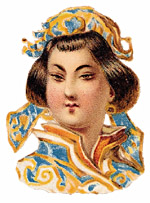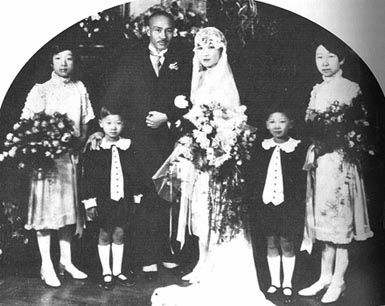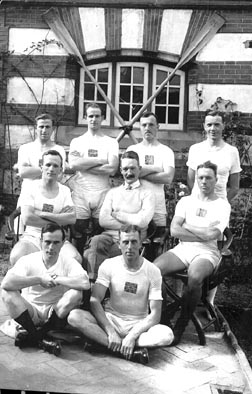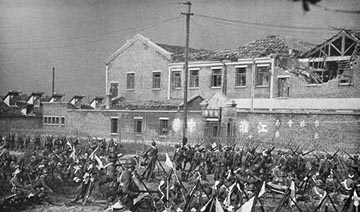 | (part two) Written and researched by Margaret Odrowaz-Sypniewska, B.F.A.  |
Most people came to Shanghai to seek their fortune, and no expense was spared on food and liquor. In the early days, there was a ratio of one (1) woman for every ten (10) men. The Occidentals had their shooting, hunting, racquetball, rowing, billiards, and bowling just like in the British Isles. The Chinese and Anglos seldom mixed except when Chinese were hired as servants and domestics. The newcomers made very little effort to learn to speak Chinese or to understand their culture. Besides their servants, the only Chinese that they came in contact with, were their compradors (or buyers). The compradors were their translators and trading partners, and most wore black caps and sported two-inch fingernails. This, of course, representing the leisure class. Obviously long finger nails would not exist among laborers. Western businessmen depended on their "boys" to run their homes, while their compradors helped them with many transactions, such as cashing their checks and making business deals. The compradors were richly dressed and hired their own Chinese underlings.
February 1924, Constance has typhoid fever and is thought to be near death. Typhoid is caused by a germ found in shellfish, unpasterized milk, and water. Typhoid fever is very infectious. Typhoid is most common in places where the living conditions are simple and unsanitary.
November 1924 - Chinese Boy Emperor, Henry Pu-yi, is expelled from the Imperial Palace and all Manchu titles are abolished.
Nanking Road was crowded day and night since it was the exclusive strip where businesses thrived. Foochow Road was only one block behind Nanking, and it was the Chinese entertainment district with teahouses, Chinese opera, and native theaters. Actors were considered male prostitutes, in China, and were one of the lowest rungs on the Chinese social ladder, which also included slaves and female prostitutes.
Patrons of actors and prostitutes were the literati and high officials. The Chinese aristocracy was known to keep male lovers. In Shanghai one (1) in one-hundred and thirty (130) was a prostitute. Fathers often sold their daughters into this life for monetary gains.
Westerners even patronized Chinese brothels. This was because they did not have many of their own women here. Shanghai was considered unsafe for wives and children. There were also Western brothels, these were located in Hongkew. Liquor was cheap in Shanghai, You could easily get gin, whiskey, and local brews. The result of these dens of prostitution was that Shanghai had a high incidence of "social disease (VD)."
William Jardine died in England, in 1843, at age 57. His illness was long and painful, and many felt this was because of his opium trades. Over thirty million (30,000,000.00) pounds of opium were imported into China in the 1870's, and most of it came through Shanghai's port gates. Jardine's partner in crime, James Matheson got Jardine's old seat in the Parliament, bought an island off the coast of Scotland and built a castle. He lived to the age of 91. Matheson's nephew, Donald Matheson, was a major opponent of the opium trade and worked for charitable causes. He was chairman of the executive committee for the Society of Suppression of the Opium Trade.
Another opium dealer was the Jewish family of Sassoon. They traded in both opium and cotton. The Sassoon House has been made into a hotel The Sassoons invested millions of dollars in Shanghai. Thereafter, Shanghai was called "The Paris of the East."
Sassoon's building projects helped Malcolm & Co. since they were all built on concrete pilings that Alexander's company constructed. A friend of Alexander's by the name of Bothwell, was an architect and built many of Shanghai's buildings. Bothwell was "best man" at Alexander's and Constance's wedding. He built both the Hong Kong and Shanghai Bank, Customs House, and the Bank of China.
May 22, 1927 - 100,000 perish in Kansu, China earthquake.
October 16, 1926 - Chinese troop transport blows up in Chinese waters - 1, 200 perish.

in the luxurious Majestic Hotel.
His wife was Mei-Ling Soong.
1928-1929 - Three (3) million die in Northwestern China during a drought, which results in famine.
During World War I, and after, Chinese imports reached a new demand, building began on Nanking Road. The Majestic Hotel was built on Bubbling Well Road and the Astor House Hotel hosted afternoon tea dances. Soochow Road was Shanghai's foreign "red light district." Russian whores thrived there. Americans went to 52 K'angse Road to the bordello of Grace Gale (her working name). This house was reputed to be decorated in Chippendale and had an English library. British wives were not fond of the Russian whores who labelled the English women: flat chested, flat-footed, and worn out by hunting, hockey, and golf.
Chinese bordellos had their taxi-dancers in their cheong-san (Chinese long dresses with high collars and slits up both sides). Chinese girls rated the foreigners as:
French have passable legs, British/Americans have unattractive legs, while
German/Scandinavians have atrociously ugly legs. Of course, they thought their own legs to be superior to all.
By May 13, 1925 foreigners were beaten, cursed at, and spat upon. The Chinese were tired of foreigners in their midst and they wanted abolition of all foreign privileges and the unequal treatment given to the native Chinese. In 1926, approximately 70,000 foreigners were in the state of panic. Western women and children were sent home. The International Settlement lived in Shanghai free of taxes, and amassed comfortable fortunes, and foreigners had little good to say about the Chinese. Conversation at the Shanghai Club had a tone of intensely anti-Chinese sentiments. After thirty years, they still did not bother to learn Chinese. The Chinese saw this as disgraceful. Those in higher rank had distain, and thought Occidentals stupid, since the Chinese learned English.
September 30, 1925, Constance writes a letter to her sister about her life in Shanghai. It seems that Constance and Alexander finally got to take their honeymoon to Peking. She relates that they went to the Forbidden City.
Constance also mentions that the strikes are about over, and that her youngest daughter, Elizabeth, is recovering from parasite infection (worms) and is taking santonine. Santonine was an excellent remedy for the long worm—ascaris lumbricoides. However, it is dangerous to some children. Con tells her sister this is "normal" in China

my great-uncle Alexander Malcolm (front-left)
The British Consulate was in a fortress-like building near Soochow Creek with the Shanghai Club to the south. The Hong Kong and Shanghai banks were established by local taipans. The Shanghai Club was an all-male club open only to Occidentals, but there were their "boys" who served them drinks, and appetizers.
1926 - Hirohito becomes Emperor of Japan, after his father's death.
1927 - Civil war in China.
1928- Chinese steamer Hsin Hsu-Tung sinks in Yangtze River, 500 die.
January 16, 1929 - Chinese steamer Hsin wah sinks off Wagen Island, 401 die.
1930-both Constance and Alexander are in England. They return to Shanghai in 1930, leaving their two older children in English boarding schools. They travel to visit New York City; Toronto, Canada (to visit Alexander's sister, Isabella); Detroit, Michigan (to visit Alexander's brother, William Clark Malcolm and his wife Elspeth, and their two daughters); then on to Chicago, Illinois; Los Angeles, Ca; San Francisco, Ca.; Hawaii; Japan; and finally back to Shanghai.
By 1930, because of civil unrest, the International Settlement had to allow five Chinese members to be seated on the Municipal Council, which broke the British held majority.
March 1931 - Alexander and Constance travel to England via Siberia. In England, Con is visiting and caring for her dying mother. When her mother dies in June, Alexander returns to Shanghai.
1931-Yangtze River floods causing 140,000 deaths.
1931-1932 - Chinese plague is now in the Chinese Provinces of Shansi & Shensi.
The Jewish community could not attend the Shanghai Club so they opened their own Jewish County Club. Shanghai was a city of factions. Various ethnic groups were kept apart. By 1927, there were 15,000 Russians in Shanghai, and this was the year of the Shanghai Massacre (1927). On August 14, 1927, the Chinese bombed the International Settlement. This was not intentional, it was said they were aiming for the Japanese ship Idzumo. When the Japanese fired back they panicked and dropped two bombs too early. One bomb hit the Cathay Hotel and the other the Palace Hotel, next door. 729 people were killed and another 861 were wounded.
By September 18, 1931, the Japanese begin invading China, starting in Manchuria. A Chinese crowd attacks five Japanese monks chanting on the street in Chapei.
1932 - Chinese cholera epidemic kills 32,000 people.
1933 - Constance Malcolm goes back to England, for Easter, to visit their Children. Betty is now in Malvern (age 7).

Home
Email Margaret: Margaret
This page was last updated on May 26, 2009
